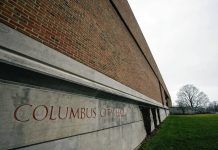The Indiana House committee chairman who killed a proposal for an independent redistricting commission Feb. 15 is still fielding criticism for that move.
This time, State Rep. Milo Smith, R-Columbus, was questioned during a Third House session by Bob Pitman, his Democratic opponent from Columbus in last year’s general election for the District 59 seat.
Pitman, who unsuccessfully challenged the six-term state representative, asked Smith on Monday why he refused to allow a vote in the Elections and Apportionment Committee to establish an independent commission to draw legislative maps.
The maps — would have been created in House Bill 1014, legislation authored by State Rep. Jerry Torr, R-Carmel — would still be subject to approval by the Legislature, according to the bill.
[sc:text-divider text-divider-title=”Story continues below gallery” ]
However, language in the measure would require Republicans who currently control state government to cede some control over a process that can determine whether they are re-elected.
In response to Pitman’s question, Smith reiterated his position that Torr’s proposal could require two costly special sessions if lawmakers disagreed with the new boundaries produced by the commission.
“If we turned those maps down twice, it would put pressure on us to agree to approve maps we didn’t necessarily agree with,” Smith said. “It would have made us look like we had no intention of approving any maps other than our own from the beginning.”
“That is the issue,” Pitman said, before attempting a follow-up question that prompted Smith to twice ask Pitman to allow him to finish his explanation.
“Reminds me of the debates we had in the last election,” Smith said to Pitman, who garnered 39 percent of the votes when he challenged Smith last year.
“They were wonderful,” Pitman said.
“Kept getting interrupted by you then, too,” Smith said.
After that comment drew a negative response from several of the 50 people in attendance, moderator Dan Arnholt asked people in the room to quiet down before granting the lawmaker’s request to complete his explanation.
“I’ve answered the question,” Smith said, without further comment.
The only other audience member to bring up redistricting Monday was retired IUPUC administrator Paul Bippen, who quoted a May 15, 2014, article by Washington Post reporter Christopher Ingraham that stated Indiana and Nevada are the two states with the least gerrymandering.
However, taxes and road funding attracted the highest interest from local residents during this week’s forum.
A roads funding package that would increase gas taxes by at least 10 cents a gallon, impose a new $15 vehicle registration fee and allow the state to seek federal authority to impose roadway tolling will be taken up by the Senate.
While the House also added a $1-per-pack cigarette tax to its proposed $31.7 billion two-year budget, that amendment is expected to face stiff opposition in the Senate.
With many GOP lawmakers saying $1.2 billion is needed annually for roads and bridges, Milestone Contractor vice president Mark Thompson voiced his support for proposals to increase funding. However, Thompson also urged state lawmakers to keep ahead of projected growth in local traffic.
Since a bill requires all gas tax money be spent for roads and related infrastructure, retired businessman and former Columbus City Council member Jesse Brand asked how the cost of programs currently covered by gas tax revenue will be funded.
Smith said he’s confident Indiana’s economy is strong enough to fill any funding holes.
Other topics that came up during Monday’s Third House session included making the state school superintendent an appointed post and proposed changes in civil forfeiture laws.
At the halfway mark in this year’s session, the Indiana House has created 681 bills, with 24 percent of them passed on to the Senate, Arnholt said.
Of the 580 bills originating in the Senate, about 32 percent have now moved onto the House for consideration, Arnholt said.
[sc:pullout-title pullout-title=”No Third House next week” ][sc:pullout-text-begin]
Due to spring break in Columbus, the weekly Third House legislative session will not be held next Monday at Columbus City Hall.
The next session will begin at 7:30 a.m. March 20.
Sponsored by the Columbus Area Chamber of Commerce, the meetings in the first-floor Cal Brand meeting room at Columbus City Hall, 123 Washington St., allow residents to learn where their representatives stand on matters before the state legislature.
[sc:pullout-text-end]




